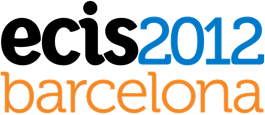Barcelona on June 10-13, 2012ESADE, Barcelona, Spain



the 20th European Conference on Information Systems



the 20th European Conference on Information Systems
The topic of technology substitution, or the replacement of one technology with another by businesses and individuals, is increasingly a focus of attention in IS research. The substitution perspective evaluates comparative characteristics of the substitute technology over the existing technology. This differentiates substitution from technology adoption, which considers the new technology artifact in isolation.
Substitution manifests itself in many domains. Examples include the replacement of IPv4 with IPv6, IT security and the transition from physical to streaming media and changes in corresponding business models.
Technology substitution is both an outcome and a driver of welfare. After the initial adoption improvements in productivity and welfare are usually caused by the substitution of the existing technology with a new, more efficient one. Thus substitution factors play an increasingly important role in the welfare of countries, organizations and individuals.
Carleen Maitland Associate Professor College of Information Sciences and Technology The Pennsylvania State University USA cmaitland@ist.psu.edu
Nicolai Pogrebnyakov Assistant Professor Copenhagen Business School Denmark nicolaip@cbs.dk
The topic of technology substitution, or the replacement of one technology with another by businesses and individuals, is increasingly a focus of attention in IS research. The substitution perspective evaluates comparative characteristics of the substitute technology over the existing technology. This differentiates substitution from technology adoption, which considers the new technology artifact in isolation.
Substitution manifests itself in many domains. The replacement of IPv4 with IPv6 is one example, especially considering the role governments have played in incentivizing this substitution across all sectors, including national and sub-national governmental entities and the for- and non-profit private sectors. IT security is a critical area of substitution, as governments and companies need to stay one step ahead of terrorists and criminals. Other examples of substitution are the replacement of corporate knowledge repositories with more flexible collaboration tools (often labeled Enterprise 2.0); and the transition from physical to streaming media and changes in corresponding business models.
Technology substitution is both an outcome and a driver of welfare. Many processes and functions have already become technology-enabled, and the range of operations supported by technology is constantly increasing. After the initial adoption further improvements in productivity and welfare are usually caused by the substitution of the existing technology with a new, more efficient one. Thus substitution factors play an increasingly important role in the welfare of countries, organizations and individuals.
Topics in this panel include the following:
This is not an exhaustive list and other substitution-related topics are welcome.
All types of contribution are invited: full research papers, research-in-progress papers as well as teaching cases.